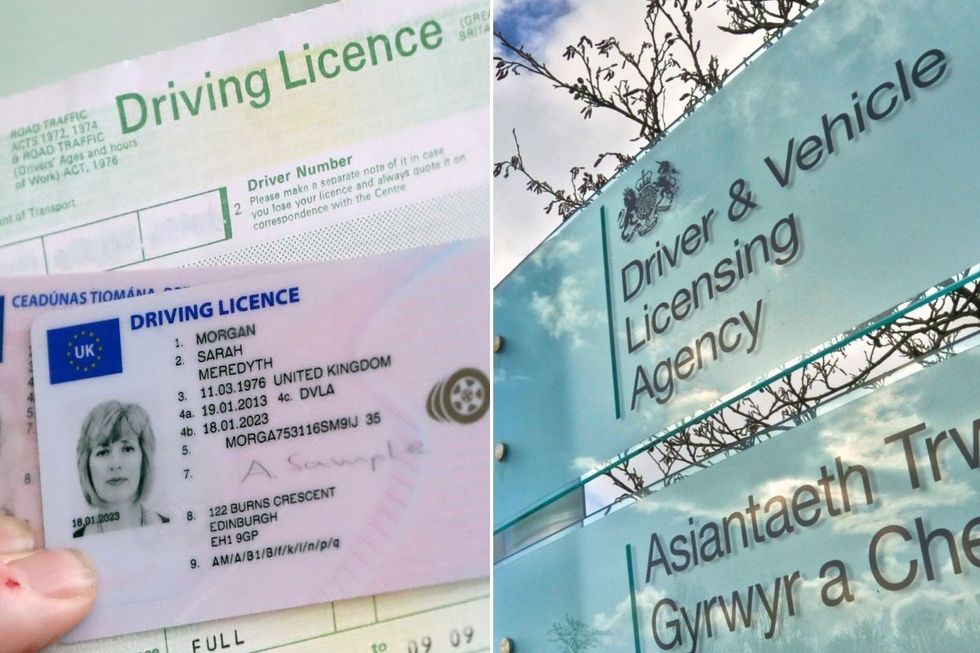'From cancer to neurological disorders, it's crucial for drivers to recognise the significance of reporting these conditions to authorities'
Don't Miss
Most Read
Trending on GB News
Drivers are being warned that they risk a £1,000 fine if they do not tell the DVLA about medical conditions that could lead to road safety issues.
Motorists are required to inform the DVLA about a medical condition or disability which could affect their ability to drive safely.
If they have a driving licence and they develop a "notifiable" medical condition or disability, or the condition worsens, they must tell the DVLA.
Failure to inform the Driver and Vehicle Licensing Agency (DVLA) could see them slapped with a fine worth £1,000. They could even be prosecuted if they are involved in an accident as a result of their condition.
Do you have a story you'd like to share? Get in touch by emailingmotoring@gbnews.uk

Drivers are expected to tell the DVLA of any notifiable medical conditions that may impact their ability
PA/DVLA
Common conditions are included in the list which require the DVLA to know about such as diabetes, heart conditions, sleep apnoea, epilepsy, strokes and glaucoma.
An expert from BigWantsYourCar.com reiterated the warning from the DVLA, urging motorists to look at the conditions listed to see if they need to notify the agency.
They said: "By keeping the DVLA informed about any changes in health status, drivers actively contribute to a safer driving environment for themselves and others.
"The extensive list provided by the DVLA encompasses a wide range of medical conditions that could impact driving ability.
"From cancer to neurological disorders, it's crucial for drivers to recognise the significance of reporting these conditions to authorities."
Motorists must surrender their licence to the DVLA if their doctor tells them to stop driving for three months or more, if their medical condition affects their ability to drive safely and lasts for more than three months, or if they do not meet the required standards for driving.
Motorists are able to apply to get their licence back when they meet the medical standards again, which usually requires backing from a doctor and they aren't currently disqualified.
People with diabetes should inform the DVLA if their insulin therapy extends beyond three months, if they experienced gestational diabetes, or if they suffer from incapacitating low blood sugar.
Drivers need to inform the DVLA if they have any of the following conditions
- Agoraphobia
- Alcohol problems
- Alzheimer’s disease
- Amputations
- Angiomas or cavernomas
- Ankylosing spondylitis
- Anorexia nervosa
- Anxiety
- Aortic aneurysm
- Arachnoid cyst
- Arrhythmia
- Arteriovenous malformation
- Arthritis
- Ataxia
- ADHD
- AIDS
- Bipolar disorder (manic depression)
- Blood clots
- Blood pressure
- Brachial plexus injury
- Brain abscess, cyst or encephalitis
- Brain aneurysm
- Brain haemorrhage
- Traumatic brain injury
- Brain tumour
- Broken limbs
- Brugada syndrome
- Burr hole surgery
- Cataracts
- Cataplexy
- Central venous thrombosis (if still having problems after one month)
- Cerebral palsy
- Cognitive problems
- Congenital heart disease
- Fits, seizures or convulsions and driving
- Déjà vu and driving
- Defibrillators
- Dementia
- Depression (if it impacts your ability to drive safely)
- Diplopia (double vision)
- Dizziness or vertigo (if sudden, disabling or recurrent)
- Drug use
- Empyema (brain)
- Essential tremor (if it impacts your ability to drive safely)
- Eye conditions
- Guillain Barré syndrome
- Head injury (serious)
- Heart failure (if it impacts your ability to drive safely)
- Heart palpitations
- Hemianopia
- Hodgkin’s lymphoma
- Huntington's disease
LATEST DEVELOPMENTS:
 Diabetes is one of the DVLA's notifiable medical conditions PEXELS
Diabetes is one of the DVLA's notifiable medical conditions PEXELS- Hydrocephalus
- Hypoglycaemia
- Hypoxic brain damage
- Intracerebral haemorrhage
- Korsakoff's syndrome
- Labyrinthitis (if symptoms last three months or longer)
- Learning disabilities
- Lewy body dementia
- Limb disability
- Long QT syndrome
- Marfan's syndrome
- Medulloblastoma
- Meningioma (if it impacts your ability to drive safely)
- Motor neurone disease
- Muscular dystrophy
- Myasthenia gravis
- MyoclonusNarcolepsy
- Night blindness
- Obsessive compulsive disorder (if it impacts your ability to drive safely)
- Excessive sleepiness
- Optic atrophy
- Pacemakers
- Paranoid schizophrenia
- Paraplegia
- Parkinson’s disease
- Peripheral neuropathy
- Personality disorder
- Pituitary tumour
- Post traumatic stress disorder (PTSD) (if it impacts your ability to drive safely)
- Psychosis
- Psychotic depression
- Pulmonary arterial hypertension
- Severe memory problems
- Stroke (if you're still having problems after one month)
- Surgery (if you're still unable to drive three months later)
- Syncope (including blackouts or fainting)
- Seizures/epilepsy
- Sleep apnoea
- Schizo-affective disorder
- Schizophrenia
- Scotoma
- Severe communication disorders (if it impacts your ability to drive safely)
- Spinal conditions, injuries or spinal surgery
- Subarachnoid haemorrhage
- Tachycardia
- Tourette's syndrome (if it impacts your ability to drive safely)
- Tunnel vision
- Usher syndrome
- Reduced visual acuity
- Vertigo
- Visual field defect
- VP shunts
- Wolff-Parkinson-White syndrome









